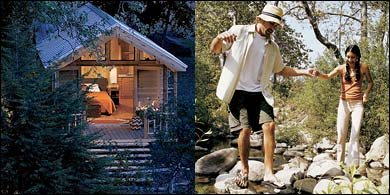AH, THE CHALLENGES OF CAMPING: How much to pack? Where to pitch the tent? Sushi or steak? And what bottle of wine to order with dinner? I’ve wrestled with these questions the past two days while anxiously awaiting my visit to the Chattooga River Resort, a combo lodge, restaurant, and campground in South Carolina’s Great Smoky Mountains, near the churning whitewater of the Chattooga and Nantahala rivers.
tree house camping
 American-style safari, El Capitan Canyon
American-style safari, El Capitan Canyon
When I arrive, I pitch my tent at the best of the 30 secluded spots: a little clearing by a bend in bubbling Long Creek hidden behind a grove of hemlocks and poplars—and a five-minute walk through the woods to the restaurant and lodge.
There will be no ramen and Bud Light tonight. Instead, I’ve already ordered my meal by e-mail, having chosen from a menu that includes filet mignon, California rolls, and pork tenderloin. I settled on salmon teriyaki sushi, which is waiting for me in a cooler by the picnic table. The wine list ranges from a $14 California red table wine to a 2000 Château Mouton Rothschild Bordeaux that runs $569. The chill in the spring air, I knew, would call for a red, but the fish wanted to be with a white. Unable to decide, I typed, “And a bottle of whatever you think sounds good.”
Fortunately, I’m in the experienced hands of campground proprietor Craig Ewing. He’s nowhere to be seen, but in the cooler is a $42 Michel Picard Beaujolais, a red so light it goes perfectly with fish. I pull out the cork and take a swig straight from the bottle—I’m roughing it, after all.
That sip of Beaujolais is my first taste of “luxury camping,” an oxymoronic term that describes a new generation of North American campgrounds snapping out table linens from Vermont to British Columbia. It’s an idea that may seem ridiculous to traditionalists who relish being in the outdoors as a chance to appreciate the bare necessities, but it’s appealing to more and more travelers who want to enjoy the natural world without the hassle of planning menus, preparing food, finding firewood, or even pitching tents.
“This is the next big thing in adventure travel,” says Chris Doyle, of the ���ϳԹ��� Travel Trade Association, an industry group representing more than 400 lodges and outfitters. “More and more folks are paying for five-star experiences in the wild. They want the stars, they want the trees, but at night they want to be more than comfortable. Luxury camping is the perfect answer to that.”
Ewing opened his campground in 2000, and his first 21 sites were booked every weekend. Two years later he added nine more sites. He’s now building another 23 or so, and he takes reservations a month in advance.
“People who come here have done the Appalachian Trail and paddled Class V rapids,” says Ewing, “but now they want to kick back and enjoy a good bottle of wine.” He also finds that a lot of his customers have the money, but not the time, for an outdoor experience. “A lot of them live in the city, work full-time, and can’t spend two hours picking up groceries before they leave,” says Ewing. “And they don’t want to get home with a cooler full of warm mayonnaise and soggy bread.”
Soggy bread isn’t on the menu at Chattooga. Much of the best stuff, in fact, isn’t listed anywhere; you just have to ask. Campers have ordered tentside massages and manicures, and more than one couple has honeymooned there, with such perks as fresh flowers on the picnic table and, at breakfast, a bottle of Dom Perignon with their orange juice.
Perhaps the most unbelievable perk, however, is in store for me when I head down the path and step into what is normally the nadir of a campground experience—the communal bathroom. Instead of flies clustering around buzzing fluorescent lights, a prison-style cement floor, and the never-quite-powerful-enough smell of disinfectant, I’m greeted by gold-plated fixtures as well as shaving cream, mouthwash, and aftershave arranged on a chrome tray next to porcelain sinks. I half expect to find an attendant handing out warm towels. And, luxury of camping luxuries, the shower water is truly hot.
The Chattooga River Resort is located in Long Creek, South Carolina, about 90 miles north of Atlanta. Tent sites cost $19 for four people; everything else, like the Dom Perignon, is extra. Preorder your food by e-mail and pull up to a fully stocked campsite. 864-647-1110,
Buck’s on the Brazos, an hour southwest of Fort Worth, Texas, offers two-room safari-style canvas tents on the banks of the Brazos River, with queen-size beds and fresh coffee delivered tentside. Set on ten acres, the tents are shaded by 100-year-old pecan trees. Buck’s doesn’t offer fancy food, but they’ll make your bed, lay out your campfire, and stack the grill with charcoal. Tents run $100 a night. 254-898-2825,
El Capitan Canyon, in Santa Barbara, California, has canvas safari tents with handmade willow beds, full linens, maid service, and massages. Tents are set in a canyon across from El Capitan State Beach, amid old-growth oak and sycamore trees. There’s a solar-panel-heated pool, 35 miles of hiking trails, and miles of Pacific Ocean shoreline. Prepared meals are available at the Canyon Market and Deli, at the canyon entrance. Tents, $135; 866-352-2729,
On the Loose Expeditions‘ two luxury yurts are in a secluded corner of a 150-acre working organic farm in Vermont’s Green Mountains. Specialty meals include pasta with a sauce made from farm-raised grass-fed beef and homegrown tomatoes. Yurts, $135; 800-688-1481,
Sky Camp‘s isolated tents come complete with log beds, reading lamps, and a view of British Columbia’s Crystal Lake. There’s a wood-fired lakeside sauna, and meals are prepared by a graduate of the Scottsdale Culinary Institute. Four-day trips to the fly-in camp, with floatplane airfare from Whistler, from US$1,250; 866-455-1601,


